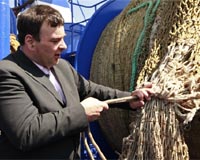 |
Naivasha, Kenya (AFP) June 23, 2009 Green campaigners in Kenya, one of the world's top flower exporters, called Tuesday for a boycott of flowers from some 30 farms contributing to the degradation of Lake Naivasha. The executive director of the Indigenous bio-diversity environmental conservation association (IBECA), James Kahora, said his group would travel to Europe to promote the "Save Lake Naivasha" campaign. "We are ready to travel even to the Holland market and various supermarkets in the United Kingdom to have our case heard as these flower farms are killing Lake Naivasha," he told reporters. Lake Naivasha, some 100 kilometres (60 miles) northwest of Nairobi, is a stunning freshwater lake considered one of the top 10 bird-watching spots in the world and one of the continent's jewels of bio-diversity. Environmentalists and biologists say that water extraction by the dozens of flower farms around the lake has contributed to a sharp decline in water levels that will eventually destroy the local ecosystem. Maasai herders have further complained that flower farms have also closed natural corridors, making it impossible for them to water their livestock. "The farmers found the Maasais here and we shall not stand back and watch as the only natural resource we know is killed by profit-oriented investors," Andrew Ole Korinko, a local Maasai leader, said. IBECA and various demonstrators on Monday prevented a local farm from extracting water from the lake through a deep canal. Local MP John Mututho gave the 30 farms targeted by the campaign two weeks to fill the canals they have dug around the lake. Many of the sprawling flower farms around Lake Naivasha and across the country are foreign-owned and send tonnes of roses and other flowers daily to European capitals and other markets such as Japan. The horticultural sector is one of Kenya's top exporters but wildlife tourism is also a key source of revenue for the east African country. Share This Article With Planet Earth
Related Links Farming Today - Suppliers and Technology
 Traditional Dutch fishermen turn to innovation for sustainability
Traditional Dutch fishermen turn to innovation for sustainabilityThe Hague (AFP) June 23, 2009 Sixth generation Dutch fisherman Louwe de Boer is part of a small group of pioneers abandoning traditional, wasteful methods and embracing innovation as a means of protecting their livelihoods. "It is the only way to survive", says the 42-year-old entrepreneur. He spent two million euros (about 2.8 million dollars) three years ago on new nets that slashed his bycatch -- animals caught ... read more |
|
| The content herein, unless otherwise known to be public domain, are Copyright 1995-2009 - SpaceDaily. AFP and UPI Wire Stories are copyright Agence France-Presse and United Press International. ESA Portal Reports are copyright European Space Agency. All NASA sourced material is public domain. Additional copyrights may apply in whole or part to other bona fide parties. Advertising does not imply endorsement,agreement or approval of any opinions, statements or information provided by SpaceDaily on any Web page published or hosted by SpaceDaily. Privacy Statement |